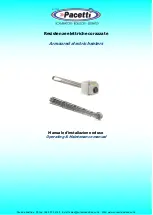
LP-389 Rev. 6.3.15
4
Products to Avoid
Areas Likely to Have
Contaminants
Spray cans containing
fluorocarbons
Dry cleaning / laundry areas and
establishments
Permanent wave solutions
Swimming pools
Chlorinated waxes / cleaners
Metal fabrication plants
Chlorine-based swimming pool
chemicals
Beauty shops
Calcium chloride used for thawing Refrigeration repair shops
Sodium chloride used for water
softening
Photo processing plants
Refrigerant leaks
Auto body shops
Paint or varnish removers
Plastic manufacturing plants
Hydrochloric or Muriatic acid
Furniture refinishing areas and
establishments
Cements and glues
New building construction
Antistatic fabric softeners used in
clothes dryers
Remodeling areas
Chlorine-type bleaches, laundry
detergents, and cleaning solvents
Garages and workshops
Adhesives used to fasten building
products
Table 1 - Products and Areas Likely to Have Contaminants
NOTE: DAMAGE TO THE HEATER CAUSED BY EXPOSURE
TO CORROSIVE VAPORS IS NOT COVERED BY WARRANTY.
(Refer to the limited warranty for complete terms and
conditions.)
Part 3 - Maintenance Schedule
A. Service Technician
The following maintenance should be performed by a qualified
service technician annually:
General
•
Attend to any reported problems.
•
Inspect the interior of the appliance; clean and vacuum
if necessary.
• Clean the condensate trap and fill with fresh water.
•
If applicable, check the condensate neutralizer and
ensure it is full of condensate neutralizing marble chips.
• Check for leaks: Water, gas, flue, and condensate.
•
Verify exhaust vent and intake piping are in good
condition and sealed tight.
•
Check exhaust vent and intake pipe bracing. Ensure
bracing is undamaged and in good condition.
•
Check appliance water pressure, piping, and expansion
tank.
•
Check control settings.
• Check ignition electrode. Sand off any white oxide.
Clean and reposition.
•
Check ignition and ground wiring.
•
Check all control wiring and connections.
• Check burner flame pattern (stable and uniform).
Additional Items if Combustion of Performance is Poor
• Clean heat exchanger and flue ways.
•
Remove burner assembly and clean burner head using
compressed air only.
The service technician should review service with the owner
after the maintenance items are completed.
B. Owner Maintenance
Periodically
•
Check area around the appliance.
•
Check and remove any blockage from the outdoor
exhaust vent and intake pipe terminations. DO NOT
perform this maintenance if exhaust vent and intake
pipe terminations are in difficult to reach locations.
•
Check the temperature / pressure gauge.
Monthly
•
Check exhaust vent and intake piping.
•
Check exhaust vent and intake pipe bracing. Ensure
bracing is undamaged and in good condition.
•
Check the pressure relief valve.
Part 2 - Combustion Air Contamination Prevention
Do not operate the appliance if its combustion air intake is
located in or near one of the areas or in the vicinity of products
listed in Table 1. These areas will always contain hazardous
contaminates that can form strong acids while passing
through the burner and vent system. These acids will corrode
the appliance’s heat exchanger, burner components and vent
system, resulting in flue gas spillage and/or water leakage,
possible substantial property damage, severe personal injury,
or death. If the appliance combustion air intake is located in
any area likely to cause or contain contamination, or if products
which would contaminate the air cannot be removed, the intake
must be re-piped and terminated to another location.
DO NOT
re-pipe ventilation system on your own. Call a qualified
service provider for assistance.

























